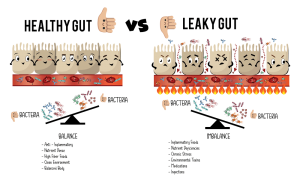When I speak to patients with autoimmune disease, they often feel doomed to their condition never improving, not realising that so much can be done to take the load off their immune system.
There are many forms of autoimmune disease such as:
| • Hashimoto’s | • Ankylosing Spondylitis |
| • Multiple Sclerosis | • Rheumatoid Arthritis |
| • Lupus | • Diabetes Type 1 |
| • Inflammatory Bowel Disease | • Coeliac Disease |
While these conditions are quite different in the symptoms they produce, what they all have in common is that the body is mistakenly attacking its own tissue.
Although no single cause of autoimmune disease has been identified, there are some things that we do know.
Autoimmune disease develops as a result of three main factors:
1. Genetic Predisposition
2. Impaired Gut Health – (Intestinal Permeability aka “leaky gut”)
3. Enviromental Toxins
Since there is not a lot we can do about our genes, the first step is to support the immune system and make sure the gut is healthy.
Did you know that over 70% of your immune system is found in the gut?
Increased intestinal permeability or “leaky gut” places a huge load on the immune system. This is because partially digestive food fragments move across the intestinal wall to circulate into other areas of the body, leading to inflammation and further abnormal immune responses.
One of the most common reasons that I see in clinic for increased intestinal permeability and inflammation are food sensitivities. Many people become sensitive to certain foods without realising it. This means that the immune system starts to react to a food that may have been previously fine to eat. When this happens, intestinal permeability and the bad bugs increase, creating a picture like the one you see below, with a cascade of increasing inflammation.

Gluten is known to trigger these types of inflammatory reactions and this is particularly well researched in relation to Hashimoto’s disease, but other foods may also be triggers. Fortunately, functional pathology allows us to investigate the state of the gut/microbiome and identify foods triggering the immune system.
The second step, if necessary, is to look at the load of environmental toxins. These can include heavy metals, mycotoxins, moulds, BPA’s, glyphosate etc. Again, functional medicine provides the tools to investigate these potential toxins, to help quickly and easily identify the triggers which might be affecting you. Keep an eye out for upcoming blogs, as I’ll talk more about these in the future.
If you would like to get to the root of your autoimmune condition, click the link to BOOK YOUR INITIAL CONSULTATION today. Alternatively, book a free 15min session to find out how Functional Medicine and Naturopathy can help you.
Share the love

About Cindy
Cindy Morris has been working as a naturopath for over 15 years, she is currently adding to her clinical skills with further study at Griffith University. Her clinical focus is around chronic fatigue, thyroid health and auto-immune conditions.




